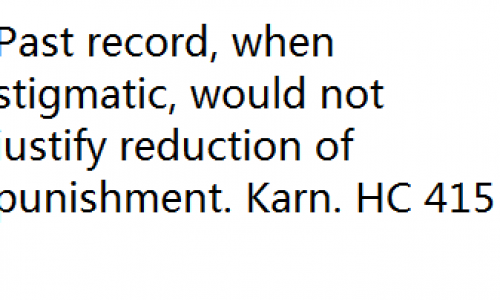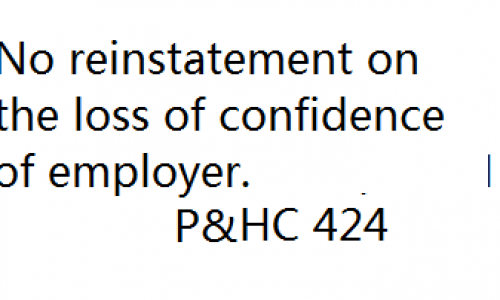2018 LLR 415
Karnataka High Court
Hon’ble Mr. K.N. Phaneendra, J.
W.P. No. 107948/2014 (I-KSRTC), D/-28-2-2018
Sri Ramappa
vs.
The Management of NWKRTC, Haveri Division
A. Dismissal – When justified – Bus conductor was dismissed from service having found him guilty of pilferage, causing damage and loss to the management, by conducting inquiry – Labour Court found held the inquiry not fair and proper – Management proved the charges before the Court against the bus conductor – His past record was full of such misconducts indicating fine imposed upon him and paid by him – Labour Court held the punishment of dismissal as proper and correct – Workman challenged the award in writ petition – Held, since the Disciplinary Authority has imposed the punishment of dismissal and the Labour Court, after having appreciated the oral and documentary evidence, has held the same justified, writ court has no jurisdiction to interfere with such factual appreciation – Hence, writ petition is dismissed. Para 10
B. Punishment – Justification of – Recognized principle of law is that if the punishment imposed is totally disproportionate to the guilt, shocking to the conscious of the court, then only court can interfere with such punishment – Misconduct on the part of delinquent employee is a continuous since long from past – Delinquent employee has not mended his ways inspite of imposition of fine upon him on various occasions – Hence, such a person does not deserve any sympathy – Any relief would be misplaced sympathy. Paras 12 and 13
C. Past Record – Effectiveness – When Past record is full of stigmas, the reduction in punishment by the Court is avoided.
D. Constitution of India – Article 226 – Writ Court have very limited jurisdiction – Only when the court below has rendered the judgement without there being any evidence or by imagination or even the evidence adduced have not at all been considered, the interference of the Writ Court is called for and not otherwise in routine manner. Para 11
For Petitioner: Sri Hanumanthareddy Sahukar, Advocate.
For Respondent: Sri Shivakumar S. Badawadagi, Advocate.
IMPORTANT POINTS
• When the Disciplinary Authority has imposed the punishment of dismissal and the Labour Court,after having appreciated the oral and documentary evidence, has held the same justified, writ court has no jurisdiction to interfere with such factual appreciation.
• Punishment of dismissal from service on account of misconduct of pilferage, causing damage and loss to the management, is justified.
• Recognized principle of law is that if the punishment imposed is totally disproportionate to the guilt, shocking to the conscious of the court, then only court can interfere with such punishment and not otherwise in routine.
• When the misconduct of pilferage, on the part of delinquent, employee is a continuous since long from past, punishment of dismissal is justified.
• Since the delinquent employee has not mended his ways inspite of imposition of fine upon him on various occasions, he does not deserve any sympathy.
• When past record is full of stigmas, on account of misappropriation of money of the employer, the reduction in punishment by the Court is avoided.
• Writ Court under article 226 of the Constitution of India have very limited jurisdiction to interference in the merits of the award passed by the Labour Court/ Industrial Tribunal.
• Writ Court may interfere in the award only when the court below has rendered the judgement without there being any evidence or by imagination or even the evidence adduced have not, at all, been considered.
ORDER
K.N. Phaneendra , J.—1. Heard the learned counsel for the petitioner and the learned counsel for the respondent and perused the records. 2. The petitioner has challenged the order passed by the Presiding Officer, Labour Court, Hubli in K.I.D. No. 60/2012 in dismissing his application challenging his order of dismissal passed by the respondent.
3. Brief factual matrix of the case are that, the petitioner was working as a conductor in Ballari Division from 21.11.1985. Later he became a permanent employee of the respondent and he was transferred to Haveri Division. Before his dismissal from service. It appears on the audit report, the respondent department found that, there was lot of pilferage of money from 16.05.1995 to 15.10.1995 by the petitioner when he was working in Ballari Division. After verification of waybills for the above said periods as verified by the Assistant Accountant, they found that on various occasions without issuing tickets moneys were collected and even the money has been misappropriated without properly accounting the same.
4. It is contended that totally a sum of Rs. 1,230 had been pilferaged for the above said period. Therefore, charges have been leveled against him and enquiry was conducted. The enquiry report was submitted by the enquiry officer to the Disciplinary Authority and the Disciplinary Authority holding the petitioner guilty of misconduct dismissed him from service. The Disciplinary Authority has in fact considered the continuous misconduct of the petitioner and found not only the allegations are proved against him for the particular period, but also his conduct for every year that he has pilferaged some amount while discharging his duty and he has paid fine after the Disciplinary Authority or the competent authority imposed such fine by providing opportunity to him to mend his conduct. But in spite of that, he did not mend himself and subsequent conduct also shows that he has been indulged in pilferage and causing damage and loss to the department.
5. Having found on evidence, the petitioner guilty, the Disciplinary Authority has imposed punishment of dismissal and passed the order, which was challenged in KID No. 60/2012 before the Labour Court, Hubli.
6. Though the Labour Court has given its finding that the domestic, enquiry conducted was not fair and proper, but thereafter provided opportunity to both the parties. It is seen from the records that on the side of the petitioner he was examined himself as WW.1, but he did not chose to mark any document, on the side of the respondent MWs. 1 and 2 were examined and marked. Exs. M 1 to M.32.
7. The Labour Court has also in detail considered the factual aspect of the case and it also reiterated that, the guilt of the accused has been proved from the evidence of MWs. 1 and 2. The contention taken by the petitioner was also meted out by the Labour Court. He has mainly taken up the contention that Audit Clerk and Cashier have also committed mistake while considering the waybill and the other materials. The court observed that, though those persons are also might have committed mistake, that itself is not sufficient to exonerate the petitioner as he has also one of the major persons who has committed such misconduct. It is considered by the Trial court that the tickets book which was having opening No. 395459 has not even been traced, whereabouts of the said tickets book was also not satisfactorily explained in the defence by the petitioner.
8. Apart from the above, the Labour Court also considered the involvement of the petitioner in 42 NINC (ticket riot issued money not collected) cases and he was given punishment in all those cases and he has paid penalty by way of fine in those cases. It clearly goes to show that even much prior to those 42 cases also he had been indulged in pilferage by committing NINC cases.
9. Considering overall materials on record, the Labour Court also came to the conclusion that, the decision taken by the Disciplinary-Authority as proper and correct.
10. When two authorities particularly Disciplinary Authority and the Labour Court after appreciating the oral and documentary evidence on record have come to the same conclusion, this court gets no jurisdiction to interfere with said factual appreciation by the Disciplinary Authority and the Labour Court.
11. Normally this court should not interfere with the facts found by the courts below like Disciplinary Authority and the Labour Court, unless it is shown to the court that, the court has rendered the judgment without there being any evidence or by imagination or even the evidence which are adduced have not at all been considered. If such grounds are not available to the petitioner on facts, this writ court cannot interfere with the orders passed by the Labour Court.
12. Last but not least, the learned counsel strenuously requests this court to reduce the punishment imposed by the Labour Court. It is also well recognized principle as laid down by the Apex Court in various cases that, if the punishment imposed either by the Disciplinary Authority or by Labour Court is totally disproportionate to the guilt of the delinquent official and such disproportionate punishment is shocking to the conscious of the court, then only the Court can interfere with such punishment. In this case as could be seen from the entire materials on record, the conduct of the petitioner throughout right from the day of joining the duty, he has been indulged in such misconduct causing damage to the department, inspite of the authorities have imposed fine upon him on various occasions and being deposited the said fine amount, he did not mend his conduct.
13. Under the above said circumstances, if the sympathy is shown that will become a shocking material. Therefore, this court is of the opinion that no sympathy can be shown to such persons. Hence order passed by the Labour court is proper and correct it does not call for any interference. For the above reasons, the following order is passed.



